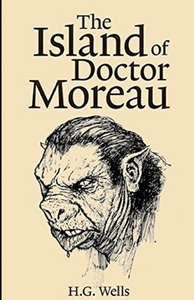Take a photo of a barcode or cover
Whoa! Yucky! (But pretty good) I learned that a "ha-ha" is a wall where there's a hill going down to it so you say in surprise, "ha-ha! A wall!" And I learned about Slojd, which is apparently a thing Scandinavians still do where you learn how to make things as part of school.
BAM.
BAM.
dark
mysterious
tense
medium-paced
adventurous
challenging
dark
mysterious
tense
fast-paced
Plot or Character Driven:
A mix
Strong character development:
N/A
Loveable characters:
Complicated
Diverse cast of characters:
N/A
Flaws of characters a main focus:
N/A
It's fine. Not Wells' best work, and it has some pacing issues, but also some interesting ideas. Frankly though, it felt like an interesting idea that was never quite worked through to its ethical and moral implications. It comes close, but doesn't quite get there. Wells's compelling and fast-paced prose helps overcome that to some degree, although it's ultimately far less memorable than his other work (The Time Machine, The War of the Worlds, The Invisible Man).
This is one of those classics where most of us know the story. It's been adapted many times and riffed on even more. Yet many have never read the source material and that includes me. I have to say it was much more readable than I expected.
Let me get this out of the way quickly. Yes, there are a few areas that to today's society are absolutely wince-worthy in terms of race and sexual roles. While I certainly wouldn't accept this in anything modern, I try to keep in mind when something was written (1896 in this case. My great grandmother was nine at the time). To the book's credit, there isn't much of it. When the book refers to M'Ling as black faced (as it does unfortunately often) it's more referring to the creature's gorilla beginnings rather than to race. But there is one instance of referring to it as Negroid and another beast man as 'good of face but coarse like a Hebrew,' and only the female beast people are clothed for 'decency's sake.' So yeah that's not of the good but given it's time period it's unfortunately also expected. This is why diversity and representation is so important these days.
For a late Victorian/Edwardian piece of SF, this is actually quite insightful and hits on things today. In it's time it was quite blasphemous (and frankly with the way in the last several years science has been treated like a direct insult to religion we haven't progressed as far as we should on that front). Granted today the idea of vivisecting animals into humans is laughable it wouldn't have been in its time. Today we would have written this story with gene splicing and Crispr and in 120 years would probably seem naive.
The story loses a bit of power in that we know it's happening after the fact so we know Prendick survives. It would have been scarier without that. Prendick narrowly escapes death when his ship goes down, found more dead than alive in a lifeboat by Dr. Montgomery on another ship, a ship with a strange white-haired man (Moreau), a drunk abusive captain and a bunch of zoological collections. The captain has to be a drunk because otherwise Prendick is saved and the story ends. He reasonably hates Moreau and Montgomery because he suspects what they're doing on their island but he takes it out on Prendick putting him off the ship to die (as the two Ms don't want him either).
Reluctantly Montgomery convinces Moreau that Prendick, being a science student, might be helpful but before they can indoctrinate him to their way of thinking, Prendick discovers what they're doing and remembers why Moreau was run out of England. But since he's stranded on an island with Moreau he turns a blind eye to the experimentation, hard as it is.
Through his eyes we see Moreau's cruel experiments, learn of the beast people and the god-like laws Moreau has set forth for them (which him in the role of God) and that the beast always seems to reassert itself over the human in them without 'tune ups.' And of course things go badly.
In its way, it was an exploration of Darwinism (something that is still seen as a threat, ridiculous as that is) and a scathing look at ethics in science and what happens if they're ignored. It's actually an enjoyable story, certainly way ahead of its time (as much of Wells work was. That's in many ways what defines a SF great for me personally, how well do they see the future if you will).
What amused me is the language in this. In most Victorian era stuff the language is fairly mild. It is here too but with one exception. They're always calling each other silly asses. That was so funny to me.
Let me get this out of the way quickly. Yes, there are a few areas that to today's society are absolutely wince-worthy in terms of race and sexual roles. While I certainly wouldn't accept this in anything modern, I try to keep in mind when something was written (1896 in this case. My great grandmother was nine at the time). To the book's credit, there isn't much of it. When the book refers to M'Ling as black faced (as it does unfortunately often) it's more referring to the creature's gorilla beginnings rather than to race. But there is one instance of referring to it as Negroid and another beast man as 'good of face but coarse like a Hebrew,' and only the female beast people are clothed for 'decency's sake.' So yeah that's not of the good but given it's time period it's unfortunately also expected. This is why diversity and representation is so important these days.
For a late Victorian/Edwardian piece of SF, this is actually quite insightful and hits on things today. In it's time it was quite blasphemous (and frankly with the way in the last several years science has been treated like a direct insult to religion we haven't progressed as far as we should on that front). Granted today the idea of vivisecting animals into humans is laughable it wouldn't have been in its time. Today we would have written this story with gene splicing and Crispr and in 120 years would probably seem naive.
The story loses a bit of power in that we know it's happening after the fact so we know Prendick survives. It would have been scarier without that. Prendick narrowly escapes death when his ship goes down, found more dead than alive in a lifeboat by Dr. Montgomery on another ship, a ship with a strange white-haired man (Moreau), a drunk abusive captain and a bunch of zoological collections. The captain has to be a drunk because otherwise Prendick is saved and the story ends. He reasonably hates Moreau and Montgomery because he suspects what they're doing on their island but he takes it out on Prendick putting him off the ship to die (as the two Ms don't want him either).
Reluctantly Montgomery convinces Moreau that Prendick, being a science student, might be helpful but before they can indoctrinate him to their way of thinking, Prendick discovers what they're doing and remembers why Moreau was run out of England. But since he's stranded on an island with Moreau he turns a blind eye to the experimentation, hard as it is.
Through his eyes we see Moreau's cruel experiments, learn of the beast people and the god-like laws Moreau has set forth for them (which him in the role of God) and that the beast always seems to reassert itself over the human in them without 'tune ups.' And of course things go badly.
In its way, it was an exploration of Darwinism (something that is still seen as a threat, ridiculous as that is) and a scathing look at ethics in science and what happens if they're ignored. It's actually an enjoyable story, certainly way ahead of its time (as much of Wells work was. That's in many ways what defines a SF great for me personally, how well do they see the future if you will).
What amused me is the language in this. In most Victorian era stuff the language is fairly mild. It is here too but with one exception. They're always calling each other silly asses. That was so funny to me.
I was excited to read a classic science-fiction novel and H.G.Wells is always a good choice. I admit that I didn't like the book as much as I hoped I would. But nevertheless, the idea behind the story was pretty nice and thought-provoking (I am always interested in fantastic medical and experimentation ideas, even though it is pretty horrifying mostly). I still enjoyed the book and if you are a classics fan, go ahead and read the book.
dark
tense
medium-paced
Diverse cast of characters:
Yes
Oh boy, that sure was one way to mix and match frankenstein with robinson crusoe and turn it into one gothic, racist and speciesist hellhole.
adventurous
dark
mysterious
fast-paced
adventurous
dark
mysterious
tense
medium-paced



